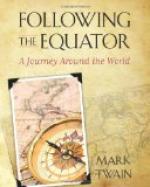This scheme could hardly have succeeded. With an army of Boers at their gates and 50,000 riotous blacks in their midst, the odds against success would have been too heavy—even if the whole town had been armed. With only 2,500 rifles in the place, they stood really no chance.
To me, the military problems of the situation are of more interest than the political ones, because by disposition I have always been especially fond of war. No, I mean fond of discussing war; and fond of giving military advice. If I had been with Jameson the morning after he started, I should have advised him to turn back. That was Monday; it was then that he received his first warning from a Boer source not to violate the friendly soil of the Transvaal. It showed that his invasion was known. If I had been with him on Tuesday morning and afternoon, when he received further warnings, I should have repeated my advice. If I had been with him the next morning—New Year’s—when he received notice that “a few hundred” Boers were waiting for him a few miles ahead, I should not have advised, but commanded him to go back. And if I had been with him two or three hours later—a thing not conceivable to me—I should have retired him by force; for at that time he learned that the few hundred had now grown to 800; and that meant that the growing would go on growing.
For,—by authority of Mr. Garrett, one knows that Jameson’s 600 were only 530 at most, when you count out his native drivers, etc.; and that the 530 consisted largely of “green” youths, “raw young fellows,” not trained and war-worn British soldiers; and I would have told. Jameson that those lads would not be able to shoot effectively from horseback in the scamper and racket of battle, and that there would not be anything for them to shoot at, anyway, but rocks; for the Boers would be behind the rocks, not out in the open. I would have told him that 300 Boer sharpshooters behind rocks would be an overmatch for his 500 raw young fellows on horseback.
If pluck were the only thing essential to battle-winning, the English would lose no battles. But discretion, as well as pluck, is required when one fights Boers and Red Indians. In South Africa the Briton has always insisted upon standing bravely up, unsheltered, before the hidden Boer, and taking the results: Jameson’s men would follow the custom. Jameson would not have listened to me—he would have been intent upon repeating history, according to precedent. Americans are not acquainted with the British-Boer war of 1881; but its history is interesting, and could have been instructive to Jameson if he had been receptive. I will cull some details of it from trustworthy sources mainly from “Russell’s Natal.” Mr. Russell is not a Boer, but a Briton. He is inspector of schools, and his history is a text-book whose purpose is the instruction of the Natal English youth.




